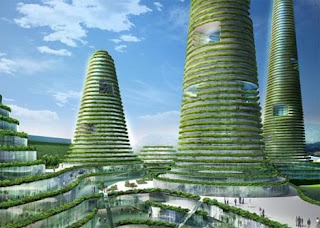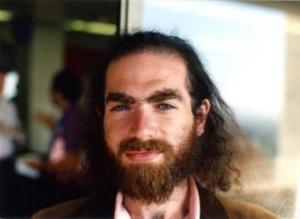High rise: sometimes a temporary stage on the way to utopia.
I've always been fascinated by high rise living. Not as a long term solution (that requires low density and low impact living), but as a temporary answer to the biggest problem: persuading the world to change. In order to do so we need to show economic benefit. We also have a lot of people wanting to live green, but they cannot afford the land under the present system. An obvious solution is to find a green society that can absorb large numbers of people into a small space, thereby creating wealth, and use that wealth to expand into lower density city forms. My land rent site is based on this principle: find a way to let people experiment with new societies, and the most attractive one will attract the most people, then outperform the rest as each person creates more wealth than they destroy.
Friends and gardens
The biggest problem with high rise is social interaction: when you don't know your neighbors then city blocks become hell on Earth (for the poor) or cages of mistrust (for the rich). A second problem is the distance between each person and any open green space. When I was a child I often toyed with the idea of being an architect, and would sketch out designs for tiered cities, where people live in high density towers yet everyone has a garden and passes many neighbours each day. It looks like this design firm had the same idea.
Why cities
As I said, this is not a long term solution, but it provides a practical way to solve overcrowding if we cannot afford much space. Many details would need to be worked out, but as a general principle cities allow each person to have a lower environmental impact because everything that can be shared is shared. For example, if you have neighbors above, below and to each side, then you don't need any heating in those directions. Economies of scale mean producing nutrition is minimally expensive. High rise mean unit land costs are minimized. Internal transport costs are minimized. Recycling can become more and more efficient due to economies of scale. Then once we can create all our food locally then, irony of ironies, cities become the greenest places to live.
Creating food within the city
For the same reason I am fascinated by vertical farms. And the obvious ideal is to combine the two - as the end of this article suggests:
Avatar becomes real
Taken to its extreme, every building becomes a skeleton surrounded by foliage, and we meet our neighbours as we walk along the branches. We are back to living in trees, except these are giant trees as in Avatar. In the future knowledge economy the heart of each tree would be its knowledge, its social networks, its wisdom. I am not a great fan of Avatar - in the real world the movie could not work for numerous reasons (in particular, after defeating the Earth people, Earth would see Pandora as a massive threat and nuke it from orbit), but everyone living in giant wise trees makes a lot of sense.
Taken to its extreme, every building becomes a skeleton surrounded by foliage, and we meet our neighbours as we walk along the branches. We are back to living in trees, except these are giant trees as in Avatar. In the future knowledge economy the heart of each tree would be its knowledge, its social networks, its wisdom. I am not a great fan of Avatar - in the real world the movie could not work for numerous reasons (in particular, after defeating the Earth people, Earth would see Pandora as a massive threat and nuke it from orbit), but everyone living in giant wise trees makes a lot of sense.





